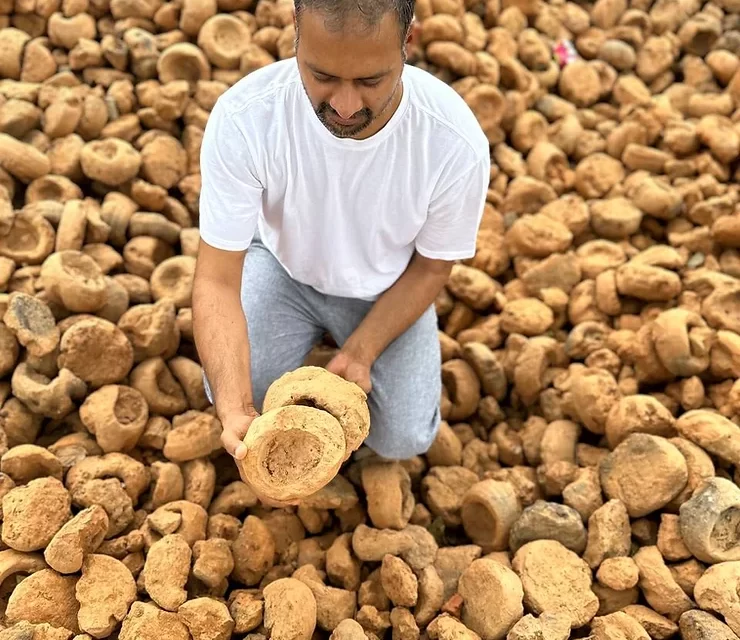Petrichor Earth Attar Oil
Gandha Bhoomi or Petrichor Earth Attar oil is one of the rarest attar oils. Petrichor in French means “the smell of raindrop coming from the dry earth after a long summer”.
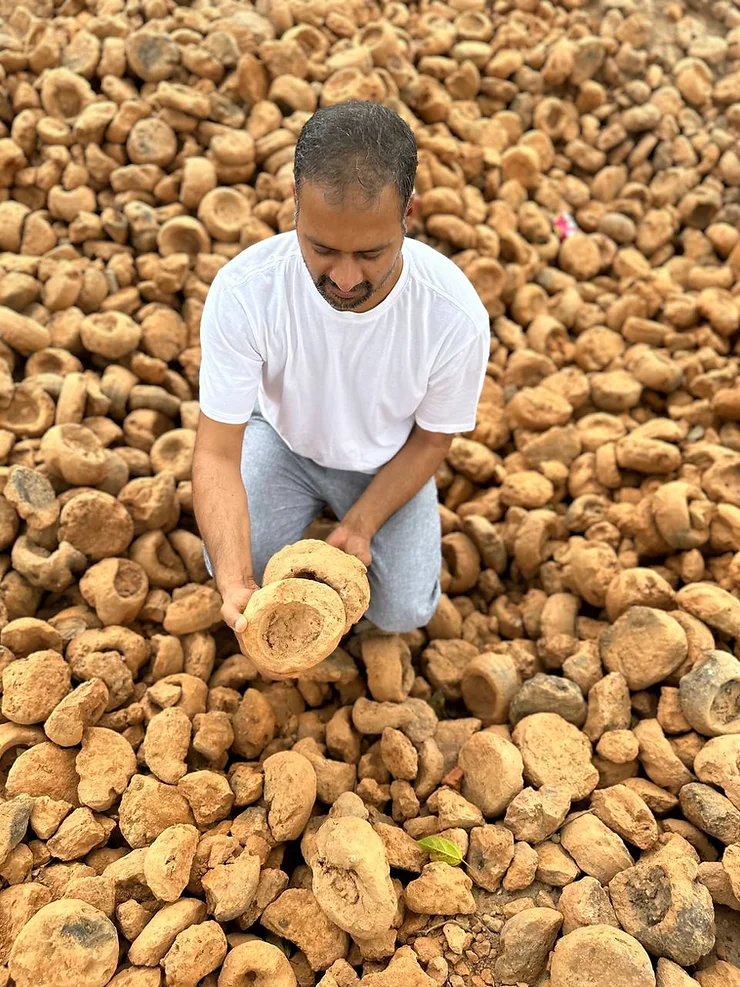
Clay from selected ponds
In India it has been known for thousands of years as Gandha Bhoomi, The Very Existential Aroma of Mother Earth. It can also be called “First Monsoon Smell”, “Rain Earth Smell” and “Mother Earth Smell”.
This rain earth smell phenomenon was first scientifically described in west in a March 1964 paper by Australian researchers Isabel Bear and D. Thomas, published in the journal Nature. Thomas coined the term “petrichor” to refer to what had previously been known as “argillaceous odour”. The word Petrichor comes from the Greek words ‘petra’, meaning stone, and ‘ichor’, which in Greek mythology refers to the golden fluid that flows in the veins of the immortals.
When a raindrop lands on a porous surface, air from the pores forms small bubbles, which float to the surface and release aerosols. Such aerosols carry the scent, as well as bacteria and viruses from the soil. Raindrops that move at a slower rate tend to produce more aerosols.
The human nose sensitive to geosmin, a terpene with an earthly odor. Human nose is able to detect it at concentrations as low as 0.4 parts per billion. Among animals, camels in the desert also rely on petrichor to locate sources of water such as oases. In yogic culture it is believed that humans appreciate the rain scent because everything is a piece of the planet including our human bodies. And we despite of being at the last chain of evolution are deeply connected to the planet as we are born from mother earth. Once this deep connection to planet gets disturbed various psychosomatic problems happen to us. That is why one of the most fundamentals practices in the yogic system is to work on the earth element. In Ayurveda Aromatherapy There are various ways to work with the earth element including the use of petrichor attar oil.
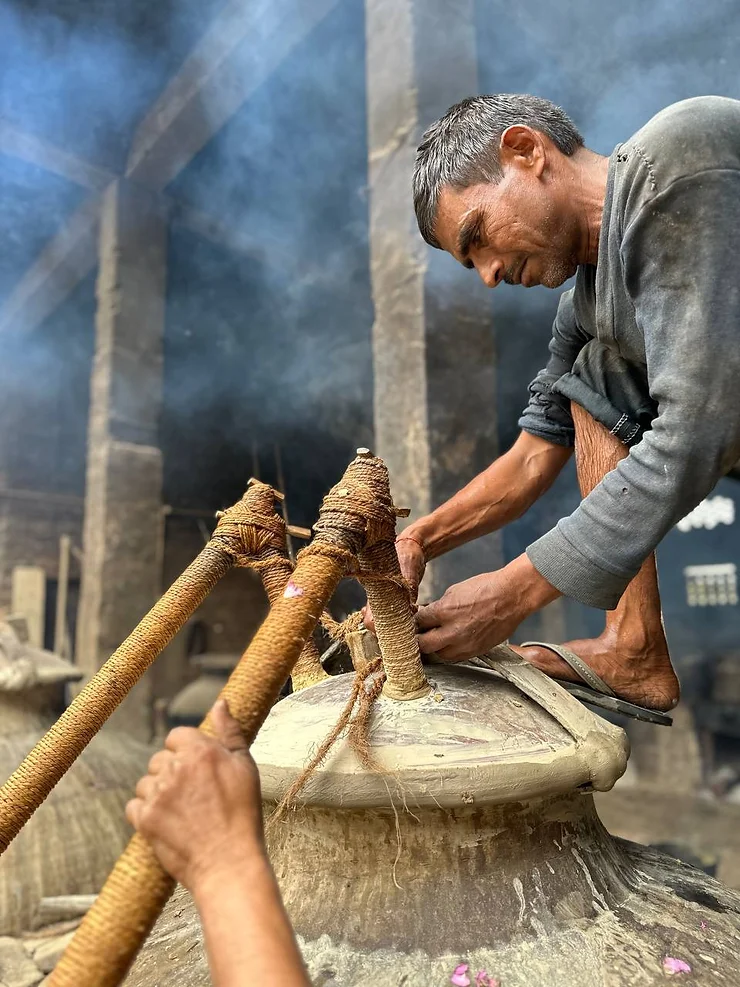
Gandha Bhoomi, Petrichor Attar Oil Distillation Process
To capture the mother earth aka petrichor smell through distillation process is one of the most difficult tasks for us.
The process behind the distillation Explained:
We at Nisarga Farms Organic use special clay from a dry pond in summers. The pond gets filled up with natural water during rainy season. Later flowers like lotus and lily bloom there. It has water during whole year except peak summer season. In India we have six seasons, and as the temperature in summer rises above 42 degrees Celsius continuously for many days, slowly the pond starts to dry. We wait for it to dry naturally. When the summer reaches at its pinnacle with very less moisture in the pond, we dig out the fermented clay from the pond. Sometimes a small rain disturbs the whole process as the smell evaporates in this. So, we wait for the least moisture just before the rain dissipates the smell from the pond clay. If mild rain happens then we in such a situation we again wait for the pond to get almost dry. After digging out the clay carefully we give it certain shape and bake it very mildly. That’s how you see some baked clay in the copper distillation apparatus. From this mildly baked clay we distil rarest attar oil “Gandha Bhoomi” aka “Petrichor”. Once the distillation begins, it takes 45-60 days to finish the whole process.
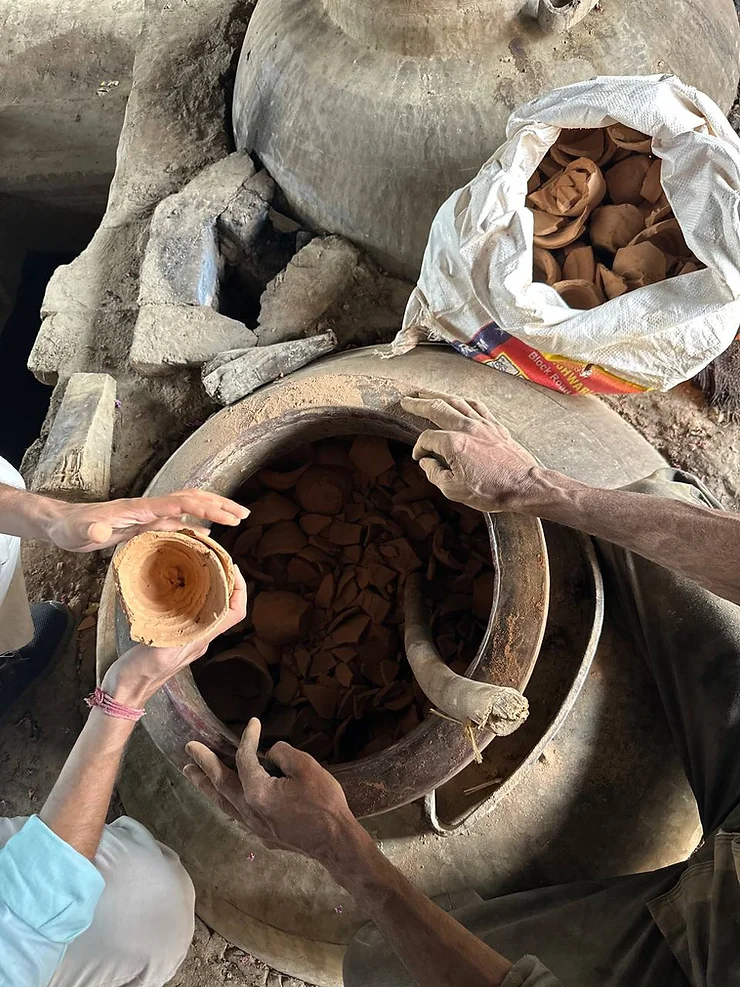
Filling Up the Copper Distillation apparatus with selected Baked clay
As you can imagine it very intensive process. Before the distillation, it takes additional 25 days more. Overall, we consider 80-90 days to finish the complete process of distillation of Petrichor Earth Attar Oil.
It takes almost 6 seasons, and almost one year of patience, and approximately three months to distil rarest Petrichor attar oil.
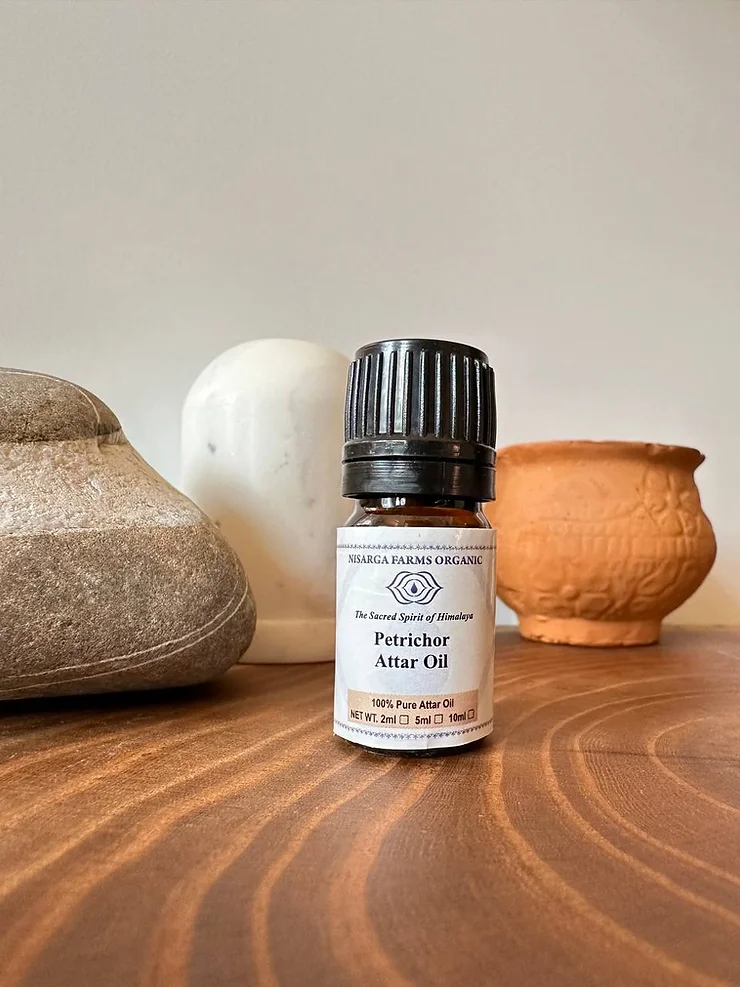
Final Product. Image Nisarga Farms Organic
The main ingredients of our Petrichor Attar oil are:
1. Special Clay from a selected pond after a waiting of almost 12 months just before the rainy season.
2. Our Sandalwood essential oil to enrich and boost the petrichor aroma.
3. Our Golden jojoba to facilitate in rare distillation process.
How do you call such a rare sacred earth oil in your local language?
Would you like to try such a rare beauty?
Written by Krishana Chaitanya & MSA Team.
Krishana lives in Himalaya, India and is one of the founders of Mysore School of Ayurveda Aromatherapy (MSA) https://www.mysoreschoolofaromatherapy.com/
MSA Instagram: @learn.aromatherapy
Email: mysorearomatherapy@gmail.com
MSA Telegram Channel in English : https://t.me/ayurvedaaromatherapy
Youtube Channel: www.youtube.com/@MysoreSchoolofAromatherapy
Krishana is also co-founder of Nisarga Farms Organic. Instagram @essentialoildistiller
You can connect to Krishana for consultation regarding Ayurveda aromatherapy, for psychology health solution, yoga, meditation, aromatic crops cultivation and oil distillation on his personal Instagram/telegram @aromatherapist_krishana and his email – ayurvedaaromatherapist@gmail.com
This Article and all other contents on this online platform is Copyright © Mysore School of Aromatherapy, NGPL Pvt. Ltd. All rights reserved.
You CAN copy, share and use this for educational purposes and give credit to the author Krishana Instagram/MSA website/ Nisarga Farms website/Telegram.
Mysoreschoolofaromatherapy.com contains articles on many oils and (sometimes on) their benefits; however, there is absolutely no assurance that any statement contained or cited in an article on health benefit matters is true, precise, or up-to-date. Even if a statement made about oil and its effect is accurate, it may not apply to you or your symptoms.


